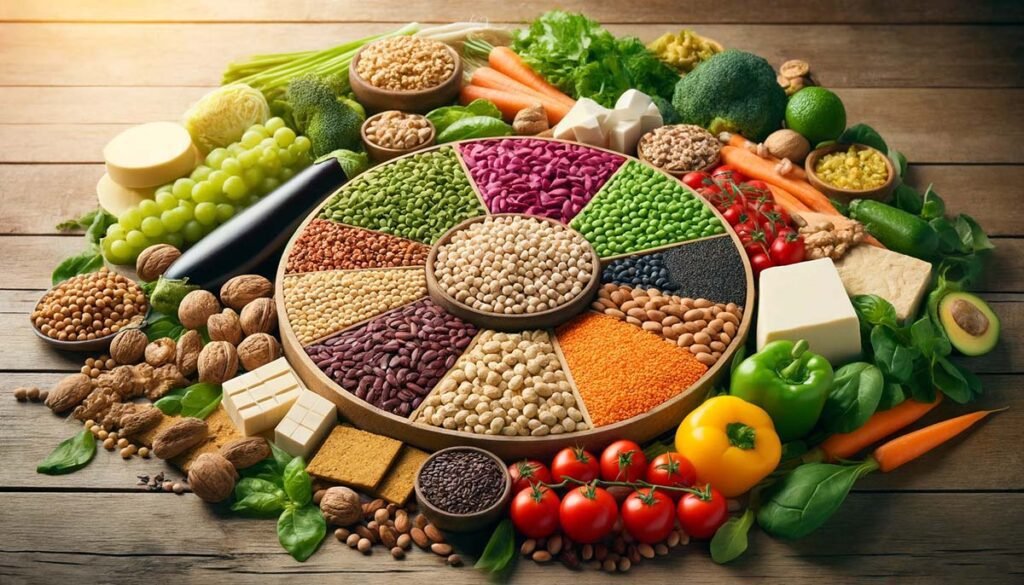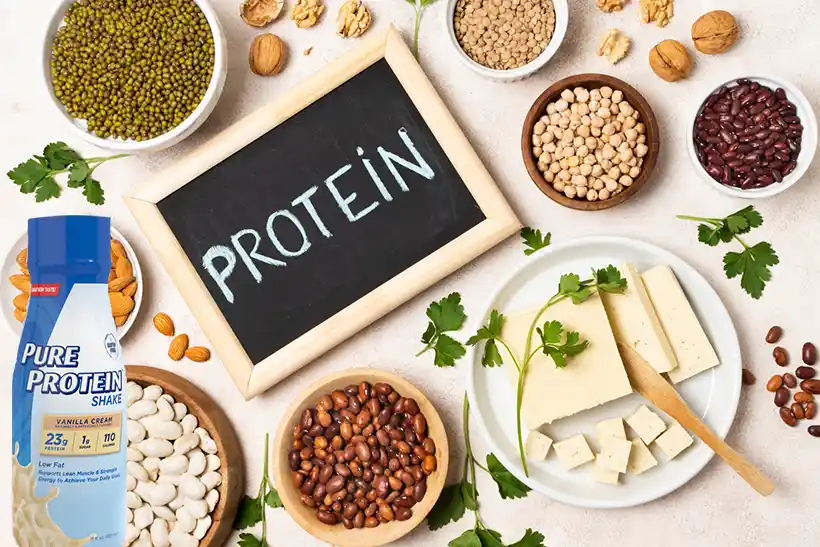In the realm of nutrition, protein is essential for overall health and well-being, serving as a crucial building block for muscles, tissues, enzymes, and hormones. For individuals following a vegetarian diet, obtaining an adequate amount of protein from plant-based sources is not only achievable but also offers various health benefits. Wellhealthorganic.com emphasizes natural and organic approaches to nutrition, making it an ideal resource for exploring vegetarian protein sources. This guide explores diverse plant-based protein options, their nutritional benefits, and tips for incorporating them into a balanced diet.
Importance of Protein in a Vegetarian Diet
Proteins are composed of amino acids, which are vital for various bodily functions, including muscle repair, immune function, and hormone production. While animal products traditionally provide complete proteins containing all essential amino acids, vegetarian diets can also meet protein requirements by combining different plant-based sources.
Nutrient-Rich Vegetarian Protein Sources
- Legumes:
- Lentils: Rich in protein, fiber, and iron, lentils are versatile and can be used in soups, stews, salads, and as a meat substitute in various dishes.
- Chickpeas: High in protein and fiber, chickpeas can be used to make hummus, added to salads, or roasted for a crunchy snack.
- Black beans: Packed with protein, fiber, and antioxidants, black beans are ideal for soups, burritos, and vegetarian burgers.
- Quinoa:
- A complete protein source containing all nine essential amino acids, quinoa is gluten-free, high in fiber, and versatile enough to be used in salads, stir-fries, and as a substitute for rice.
- Nuts and Seeds:
- Almonds: Rich in protein, healthy fats, and vitamin E, almonds make a nutritious snack and can be used as almond butter or added to salads and granola.
- Chia seeds: High in protein, omega-3 fatty acids, and fiber, chia seeds can be added to smoothies, yogurt, or used as a thickening agent in puddings.
- Hemp seeds: A complete protein source, hemp seeds contain omega-3 and omega-6 fatty acids and can be sprinkled on salads, yogurt, or blended into smoothies.
- Tofu and Tempeh:
- Tofu: Made from soybeans, tofu is a versatile protein source that absorbs flavors well and can be grilled, stir-fried, or used in soups and salads.
- Tempeh: Fermented soybean product rich in protein, probiotics, and nutrients, tempeh can be sliced, marinated, and used in sandwiches, stir-fries, or as a meat substitute.
- Whole Grains:
- Brown rice: Contains protein, fiber, and essential nutrients, making it a staple in vegetarian diets and suitable for pilafs, stir-fries, and side dishes.
- Oats: High in protein and soluble fiber, oats can be used in breakfast cereals, baked goods, or as a base for overnight oats and smoothies.
- Leafy Greens and Vegetables:
- Spinach: Rich in protein, iron, vitamins, and minerals, spinach can be used in salads, soups, smoothies, and sautéed dishes.
- Broccoli: Contains protein, fiber, and antioxidants, broccoli is versatile and can be steamed, roasted, or added to stir-fries and pasta dishes.
Tips for Maximizing Protein Absorption
- Combine Protein Sources: Pair incomplete protein sources (e.g., beans and rice, hummus and whole wheat pita) to create complete proteins that contain all essential amino acids.
- Include Variety: Incorporate a diverse range of protein-rich foods throughout the day to ensure adequate intake of essential nutrients.
- Consider Supplements: If necessary, consider vegetarian protein supplements like pea protein powder or soy protein isolate to meet protein needs, especially for athletes or those with higher protein requirements.
Benefits of Vegetarian Protein Sources from Wellhealthorganic.com
- Organic and Natural: Emphasizing organic and natural approaches to nutrition, wellhealthorganic.com promotes protein sources free from pesticides, hormones, and additives.
- Sustainable Choices: Plant-based proteins generally have a lower environmental impact compared to animal-based proteins, supporting sustainability efforts.
- Health Benefits: Vegetarian protein sources are often lower in saturated fats and cholesterol, promoting heart health and overall well-being.
OVERVIEW OF VEGETARIAN PROTEIN SOURCES

A Diverse Array of Options
Vegetarian diets offer protein-rich foods that meet nutritional needs without relying on animal products. These diverse sources include legumes, nuts, grains, and soy-based products. Each category provides unique health benefits and can be incorporated into various culinary practices, ensuring nutritional adequacy and variety.
Key Categories of Vegetarian Proteins
- Legumes: Including beans, lentils, and chickpeas, these are rich in protein and fiber, supporting digestive health and satiety.
- Nuts and Seeds: Almonds, walnuts, chia seeds, and flaxseeds are excellent sources of protein and healthy fats.
- Grains: Quinoa is a complete protein, offering all nine essential amino acids.
- Soy Products: Tofu and tempeh are versatile and nutrient-dense options, popular in many vegetarian dishes.
- Dairy and Plant-Based Alternatives: For dairy consumers, products like Greek yogurt are protein-rich, while plant-based milk and protein powders offer convenient alternatives.
By exploring these categories, you can ensure a balanced and enjoyable vegetarian diet rich in protein and other essential nutrients.
LEGUMES – NUTRITIONAL POWERHOUSES
Legumes, a staple in many vegetarian and vegan diets, are among the most nutrient-dense foods available. This category includes beans, lentils, and chickpeas, all offering significant health benefits. These plant-based proteins are high in protein and rich in essential nutrients such as fiber, vitamins, and minerals.
Nutritional Profile of Legumes
Legumes are celebrated for their impressive protein content. For example, chickpeas provide about 19 grams of protein per 100 grams, while lentils offer approximately 18 grams per 100 grams. Depending on the variety, beans can range from 15 to 25 grams of protein per 100 grams. In addition to protein, legumes are high in dietary fiber, which supports digestive health and helps maintain a healthy weight by promoting a feeling of fullness.
Health Benefits of Legumes
Legumes’ high fiber content helps regulate blood sugar levels, making them an excellent choice for individuals with diabetes or those looking to manage their weight. Combining protein and fiber also contributes to a lower risk of heart disease by reducing cholesterol levels. Legumes are rich in essential vitamins and minerals, including iron, magnesium, potassium, and folate, crucial for overall health and well-being.
Culinary Uses and Versatility
One of the most appealing aspects of legumes is their versatility in the kitchen. They can be used in various dishes, from soups and stews to salads and veggie burgers. Here are a few popular culinary uses:
- Chickpeas: Ideal for making hummus, adding to salads, or roasting for a crunchy snack.
- Lentils: Perfect for hearty soups, stews, and Indian dals.
- Black Beans: Commonly used in Mexican cuisine, excellent in burritos, tacos, and as a base for veggie burgers.
- Kidney Beans: Great for chili, casseroles, and mixed with rice dishes.
Examples and Specific Protein Content
To illustrate the protein content, consider these examples:
- Chickpeas: 19 grams of protein per 100 grams.
- Lentils: 18 grams of protein per 100 grams.
- Black Beans: 21 grams of protein per 100 grams.
- Kidney Beans: 24 grams of protein per 100 grams.
By incorporating legumes into your diet, you can enjoy their nutritional benefits while exploring a variety of delicious and satisfying dishes. These nutritional powerhouses are a cornerstone of vegetarian and vegan diets, providing essential nutrients and promoting overall health.
NUTS AND SEEDS – COMPACT NUTRIENT SOURCES
Nuts and seeds are convenient and tasty snacks and pack a powerful nutritional punch. These small but mighty foods are rich in protein, healthy fats, vitamins, and minerals, making them essential to a balanced vegetarian diet. Including nuts and seeds in your meals can help meet your daily protein needs while providing numerous health benefits.
Nutritional Profile of Nuts and Seeds
Nuts and seeds are celebrated for their high protein content. For example, almonds contain about 21 grams of protein per 100 grams, while walnuts offer around 15 grams per 100 grams. Chia seeds are particularly impressive, providing approximately 18 grams of protein per 100 grams, and hemp seeds boast an even higher protein content of about 31 grams per 100 grams. These foods are also excellent sources of healthy fats, particularly omega-3 and omega-6 fatty acids, crucial for heart health and brain function.
Health Benefits of Nuts and Seeds
In addition to being protein-rich, wild seeds offer numerous health benefits:
- Heart Health: The healthy fats in nuts and seeds can help reduce LDL cholesterol levels, lowering the risk of heart disease.
- Weight Management: The combination of protein, fiber, and healthy fats helps promote satiety and reduce overall calorie intake.
- Nutrient Density: Nuts and seeds contain essential vitamins and minerals, including vitamin E, magnesium, zinc, and selenium, which support immune function, bone health, and antioxidant defense.
Culinary Uses and Versatility
Nuts and seeds are incredibly versatile and can be incorporated into various dishes:
- Almonds: Enjoy raw as a snack, add to salads, or blend into almond butter.
- Walnuts: Perfect for baking, adding to cereals, or using in savory dishes like walnut pesto.
- Chia Seeds: Ideal for making chia pudding, adding to smoothies, or using it as an egg substitute in baking.
- Hemp Seeds: Sprinkle on top of salads and yogurt or incorporate into protein bars.
- Flaxseeds: Ground flaxseeds can be added to oatmeal smoothies or used in baking for a nutritional boost.
Examples and Specific Protein Content
To highlight their protein content, consider these examples:
- Almonds: 21 grams of protein per 100 grams.
- Walnuts: 15 grams of protein per 100 grams.
- Chia Seeds: 18 grams of protein per 100 grams.
- Hemp Seeds: 31 grams of protein per 100 grams.
Incorporating a variety of nuts and seeds into your diet can provide a significant nutritional boost. These compact nutrient sources are convenient and delicious and contribute to a well-rounded and protein-rich vegetarian diet. By exploring different types of nuts and seeds, you can enjoy their diverse flavors and textures while reaping their numerous health benefits.
Conclusion
Incorporating vegetarian protein sources into your diet not only meets your nutritional needs but also supports overall health and sustainability. From legumes and nuts to whole grains and leafy greens, there are abundant options to explore and enjoy. Wellhealthorganic.com advocates for natural and organic approaches to nutrition, making it a valuable resource for discovering diverse and nutrient-rich plant-based proteins. By embracing these options and incorporating them into balanced meals, you can optimize your vegetarian diet and reap the benefits of a protein-rich lifestyle. For personalized advice on nutrition and diet planning, consult with a registered dietitian or healthcare professional.
